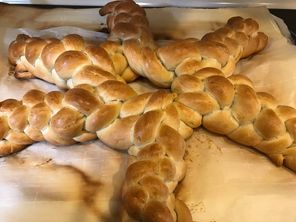When I had a child, I got serious about braiding with more than three strands. My kid likes math, so I used to try to braid a number of strands they would find significant. We started taking photographs of the bread to post on the internet because my child didn’t want to eat them if there was no way to share how pretty they looked.
I could just buy loaves of nice bread instead of baking Ashkenazi-style braided loaves. I have done that. My kid is in college. I don’t eat tons of bread during the week. Slices of challah fill my freezer. Why do I keep baking?
On days when I feel a little blue, it’s hard to say. It’s difficult to want to bake when I can’t have guests or potlucks. I got super excited that we were going to be able to have guests in the month or so after vaccinations were available to everyone, and then we got slammed with the viral variants. It felt even worse after that.
For me, Judaism means doing the same things all the time, as well as I can. Sometimes my voice is too rough for singing or I’m too tired for Talmud or Torah study. I want to do my best and pay attention, but I sometimes have to do the action whether I am ready to do my best or not. Even if I’m the only one who will eat the bread, I try to bake it anyway.
As with prayer or study or any other part of Jewish religious life, baking challah involves repetition. You get to know the ingredients and the finer points of the process. This obviously applies also to Torah study, to prayer, to everything we do. There is always something new to notice, something important to do, something essential to contribute. I do the same things all the time, but I am never the same and the conditions are never the same. Every mitzvah is a fractal, through which we see ourselves very large and very small, again and again, shaping Jewish life.

 RSS Feed
RSS Feed